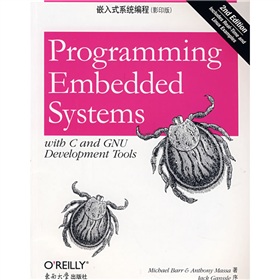嵌入式系统编程 电子书下载 PDF下载

内容简介
如果你具有C语言编程经验并且对此较为熟悉,那么《嵌入式系统编程》第二版正是你开始学习编写嵌入式软件的入门指南。
《嵌入式系统编程》第一版将这门技术教给了成千上万的人,它已成为嵌入式编程的圣经。在第二版中,我们更新了相关内容,以涵盖最新的硬件设计和开发方法论。
其中所涉及的技巧和范例代码可直接应用于真实世界里的各种嵌入式软件项目。相关例子用到了免费的GNU软件编程工具、eCos和Linux操作系统以及一种为本书特别定制的低成本硬件平台。若你获得了《嵌入式系统编程》第二版的随书工具,你将拥有一个完整的开发环境以探寻嵌入式系统中的深邃奥秘。即便你使用不同的硬件和软件,本书所提及的原理一样适用。
无论是嵌入式系统新手,还是已在嵌入式系统上做了大量工作的专业人员,你都会从本书讨论的话题中受益,它们包括:
基本调试技巧——在小巧的嵌入式系统上工作所需的关键技能
中断,和芯片内部与外围设备的监控
确定是否存在实时需求以及你的操作系统和应用程序是否能满足这些需求
在实时操作系统和嵌入式Linux中实现任务同步
优化嵌入式软件的大小、运行速度和能耗
无论你正在编写第一个嵌入式程序、设计最新潮的手持的什么东西,还是管理一群嵌入式开发工程师,《嵌入式系统编程》第二版都将帮助你提升相关知识和技能,直至你精熟嵌入式软件。 ·查看全部>>
《嵌入式系统编程》第一版将这门技术教给了成千上万的人,它已成为嵌入式编程的圣经。在第二版中,我们更新了相关内容,以涵盖最新的硬件设计和开发方法论。
其中所涉及的技巧和范例代码可直接应用于真实世界里的各种嵌入式软件项目。相关例子用到了免费的GNU软件编程工具、eCos和Linux操作系统以及一种为本书特别定制的低成本硬件平台。若你获得了《嵌入式系统编程》第二版的随书工具,你将拥有一个完整的开发环境以探寻嵌入式系统中的深邃奥秘。即便你使用不同的硬件和软件,本书所提及的原理一样适用。
无论是嵌入式系统新手,还是已在嵌入式系统上做了大量工作的专业人员,你都会从本书讨论的话题中受益,它们包括:
基本调试技巧——在小巧的嵌入式系统上工作所需的关键技能
中断,和芯片内部与外围设备的监控
确定是否存在实时需求以及你的操作系统和应用程序是否能满足这些需求
在实时操作系统和嵌入式Linux中实现任务同步
优化嵌入式软件的大小、运行速度和能耗
无论你正在编写第一个嵌入式程序、设计最新潮的手持的什么东西,还是管理一群嵌入式开发工程师,《嵌入式系统编程》第二版都将帮助你提升相关知识和技能,直至你精熟嵌入式软件。 ·查看全部>>
目录
Foreword
Preface
1.Introduction
What Is an Embedded System
Variations on a Theme
Embedded Design Examples
Life As an Embedded Software Developer
The C Language: The Lowest Common Denominator
A Few Words About Hardware
2.Getting to Know the Hardware
Understanding the Big Picture
Hardware Basics
Examine the Landscape
Learn How to Communicate
Getting to Know the Processor
Study the External Peripherals
Initialize the Hardware
3.Your First Embedded Program
Hello, World!
The Blinking LED Program
The Role of the Infinite Loop
4.Compiling, Linking, and Locating
The Build Process
Building the Blinking LED Program
A Quick Look at Makefiles
5.Downloading and Debugging
Downloading the Blinking LED Program
Remote Debuggers
Emulators
Other Useful Tools
Dig into the Hardware
6.Memory
Types of Memory
Direct Memory Access
Endian Issues
Memory Testing
Validating Memory Contents
Using Flash Memory
7.Peripherals
Control and Status Registers
The Device Driver Philosophy
Device Driver Design
8.Interrupts
Overview
Interrupt Map
Interrupt Service Routine
The Improved Blinking LED Program
Summary of Interrupt Issues
9.Putting It All Together
Application Overview
Working with Serial Ports
Command-Line Interface Processing
10.Operating Systems
History and Purpose
he Scheduler
Task Synchronization
Message Passing
Other Functionality
Interrupt Handling
Real-Time Characteristics
To Use or Not to Use an RTOS
Additional Resources
11.eCos Examples
Introduction
Task Mechanics
Mutex Task Synchronization
Semaphore Task Synchronization
Message Passing
eCos Interrupt Handling
12.Embedded Linux Examples
Introduction
Accessing Hardware in Linux
Task Mechanics
Mutex Task Synchronization
Semaphore Task Synchronization
Message Passing
13.Extending Functional
Common Peripherals
Networking for All Devices Great and Small
14.Optimization Techniques
Increasing Code Efficiency
Decreasing Code Size
Problems with Optimizing Compilers
Reducing Memory Usage
Power-Saving Techniques
Limiting the Impact of C++
Index
Preface
1.Introduction
What Is an Embedded System
Variations on a Theme
Embedded Design Examples
Life As an Embedded Software Developer
The C Language: The Lowest Common Denominator
A Few Words About Hardware
2.Getting to Know the Hardware
Understanding the Big Picture
Hardware Basics
Examine the Landscape
Learn How to Communicate
Getting to Know the Processor
Study the External Peripherals
Initialize the Hardware
3.Your First Embedded Program
Hello, World!
The Blinking LED Program
The Role of the Infinite Loop
4.Compiling, Linking, and Locating
The Build Process
Building the Blinking LED Program
A Quick Look at Makefiles
5.Downloading and Debugging
Downloading the Blinking LED Program
Remote Debuggers
Emulators
Other Useful Tools
Dig into the Hardware
6.Memory
Types of Memory
Direct Memory Access
Endian Issues
Memory Testing
Validating Memory Contents
Using Flash Memory
7.Peripherals
Control and Status Registers
The Device Driver Philosophy
Device Driver Design
8.Interrupts
Overview
Interrupt Map
Interrupt Service Routine
The Improved Blinking LED Program
Summary of Interrupt Issues
9.Putting It All Together
Application Overview
Working with Serial Ports
Command-Line Interface Processing
10.Operating Systems
History and Purpose
he Scheduler
Task Synchronization
Message Passing
Other Functionality
Interrupt Handling
Real-Time Characteristics
To Use or Not to Use an RTOS
Additional Resources
11.eCos Examples
Introduction
Task Mechanics
Mutex Task Synchronization
Semaphore Task Synchronization
Message Passing
eCos Interrupt Handling
12.Embedded Linux Examples
Introduction
Accessing Hardware in Linux
Task Mechanics
Mutex Task Synchronization
Semaphore Task Synchronization
Message Passing
13.Extending Functional
Common Peripherals
Networking for All Devices Great and Small
14.Optimization Techniques
Increasing Code Efficiency
Decreasing Code Size
Problems with Optimizing Compilers
Reducing Memory Usage
Power-Saving Techniques
Limiting the Impact of C++
Index
Copyright © 2025 by topbester.com.
All Rights Reserved.
沪ICP备14027842号-1
All Rights Reserved.
沪ICP备14027842号-1